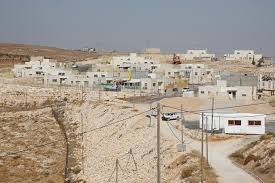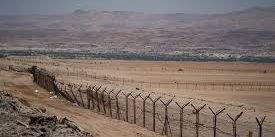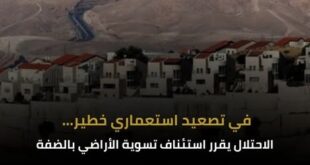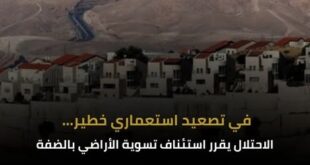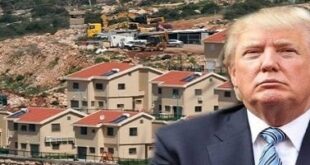By: Madeeha Al-A’raj
The National Bureau for defending land and resisting settlements stated in its latest weekly report , that the commemoration of the Land Day in Palestine remains as important as ever, but this year, we couldn’t mark it neither in the occupied Palestinian territories nor in the Diaspora due to the Coronavirus pandemic. Yet, the absence of activities in the Palestine made the scene more clear with regard to settlement expansion in light of the unlimited American support to the Israeli Occupation State, which always says, settlement in the West Bank including Jerusalem doesn’t contradict the international law and international legitimacy resolutions. Furthermore, Israel imposed a de facto on the ground by increasing settlement and military bases, the number of these settlements is about 450 settlement, the occupation government has started to legalize them as new outposts or neighborhoods affiliated to existed settlements, knowing that the number of settlers in the West Bank, including East Jerusalem, is about 850,000, of whom 620,000 reside in the West Bank settlements. Thus, the percent of settlers compared to Palestinian citizens is about 22% of the population.
It was noted that last year witnessed an increase in the pace of building and expanding settlements in the West Bank after the Israeli occupation approved the building of more than 9,000 new settlement units, besides, the establishing of 13 new settlement outposts, which led to confrontations, the most recent of which were those that took place on Jabal Al-Arma in the Beita town, south of the city of Nablus, where 2 Palestinians were killed, and dozens of people suffocated by tear gas bombs, live and rubber bullets.
On the other hand, the Palestinian government has activated its political stance on two levels. First, refuses to talk to the Israel about an Israeli medical annexation of the West Bank, considering that as a kind of guardianship. Second, early warning of the Palestinian workers, who work inside the Green Line or in settlements, being potential outposts for transmitting Coronavirus to the occupied Palestinian territories, what the Palestinian government expected and called for taking the necessary preventive measures, and called on the Palestinian workers to stop working, especially, in settlements. That was confirmed as the settlements have become a source of coronavirus infection to the Palestinian workers, who were left without test by Israel.
Concerning the ongoing settlement activities in the outpost and in the Souq Al-Dibagha (tanning market) in the buildings of “Yohana Dermar” in the occupied Jerusalem, the settlers are using time to perform prayers and ceremonies protected by the Israeli occupation forces, where they meet in large numbers there, which includes housing for 10 settlement families and a religious school at the ground floor. Moreover, Talmudic schools and religious institutes are active within the walls of the Holy City. The settlers also continue cutting hundreds of olive trees in the lands between the governorates of Bethlehem and Hebron, specifically in the lands of the Qanoub area in the town of Sa’ir, near the settlement of “Asfar”, where about 300 trees were cut from an area of 42 dunums, and before that the settlers demolished 40 vine trees and 10 olive trees, located in the “Sahel Al-Rajam” area, near the Gush Ezion settlement bloc.
As for demolishing Palestinian homes and facilities and the policy of silent ethnic cleansing, the Israeli occupation authorities continue their violations against the Palestinians. During the last week, they demolished 3 houses in Al-Diook village near the city of Jericho, and also destroyed a well and two agricultural rooms in the villages of Deir Ballut and Al-Zawiyah west of Salfit, and a house under construction in Khirbet Jubara, south of Tulkarm, and three houses under construction in the village of Rummaneh, west of Jenin. Since the declaration of the state of emergency in the Occupied Palestinian Territory on March 5th, the Israeli authorities have demolished 40 structures, displacing 26 Palestinians and damaging more than 260 houses.
On the international level, the United Nations Special Coordinator for the Middle East Peace Process, Nikolai Miladinov, considered during the Security Council’s regular session on the situation in the Middle East that the situation in the occupied Palestinian territories is “fragile” according to the thirteenth report prepared by the Secretary-General, António Guterres, on the implementation of Security Council Resolution 2334 of 2016. He emphasized that “the expansion of Israeli settlements constitutes a major obstacle to achieving a two-state solution, and that the establishment of settlements constitutes a flagrant violation of international law, as stipulated in Security Council Resolution 2334 of 2016.” Adding, the settlement must be stopped soon. He also considered that potential settlement progress in the “E1” area would prevent the establishment of a future Palestinian State.
List of Israeli Occupation and Settlers’ Assaults over the Last Week,
Documented by the National Bureau:
Jerusalem:
- Settlers and Israeli soldiers intentionally and repeatedly spitting at cars, walls and doorsteps, to riot the Palestinian people of Coronavirus.
- Arresting 4 members of the Emergency Committee to Face “Coronavirus” in Sur Baher village, and seized 300 food parcels that were to be distributed to a number of poor families.
Ramallah:
- Attacking citizen, Monther Abu Alia, from Al-Mughayer village, while he was in the northern area of the village, smashing the windows of his car.
Hebron:
- Attacking citizens in the Al-Tuwana village, east of Yatta, south of Hebron, and threw stones at them, protected by Israeli soldiers. A number of citizens were suffocated due to inhaling tear gas.
- Notification orders to stop work in barracks for the raising of livestock, covering an area of 110 meters, in the village of Al-Taban, east of Yatta, south of Hebron. They also notified Ahmed Musleh Hamamda to remove his tent and vacate his 50 donums land in which he lives with his family, in favor of Afijal settlement built on citizens’ land south of Hebron.
Nablus:
- Bulldozing several donums of land in the villages of Jalud and Qaryut, south of Nablus, planted with olive trees.
- The death of Islam Abdel-Ghani Dweikat 23, who was wounded about 3 weeks ago, in the events of Jabal Al-Arma in Beita, south of Nablus.
Salfeet:
- Demolishing a 32 m2 agricultural room in the Al-Zawiyah town, west of Salfit, in Khalet Al-Rumaila, belonging to Salah Abdel-Latif Raddad, located in his 23 donums.
Tulkarm:
- Demolishing a house under construction at the entrance to the village of Jbara, south of Tulkarm, on the pretext of not having a liccense, and seizing 3 agricultural caravans.
Jenin:
- Demolishing 3 houses under construction in the village of Rumana, near the Apartheid Wall, and 4 other citizens were notified of demolishing their homes in the village on the pretext of building without a permit.
Jordan Valley:
- Handing over evacuation orders to Khalaf Al-Rashaideh’s family to leave their barracks, and seize a residential caravan for Anwar Abu Joudeh in Khirbet Alan, Jaftlak.
- A penalty of NIS 12471 against Ahmed Moh’d Khadr Bani Odeh, to get back his bulldozer after holding it for more than 4 months, while working on lands in the Al-Buqei’a Plain, southeast of Tubas.
 المكتب الوطني للدفاع عن الارض ومقاومة الاستيطان منظمة التحرير الفلسطينية
المكتب الوطني للدفاع عن الارض ومقاومة الاستيطان منظمة التحرير الفلسطينية
